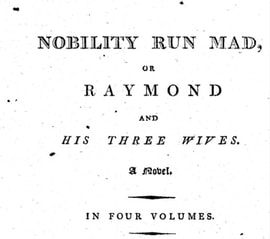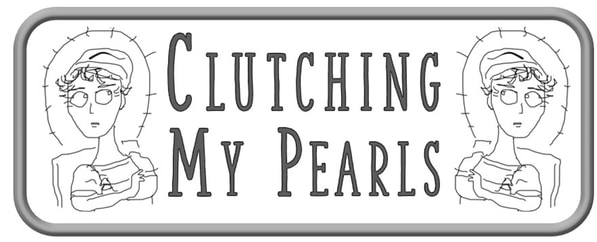| This blog explores social attitudes in Jane Austen's time, discusses her novels, reviews forgotten 18th century novels, and throws some occasional shade at the modern academy. The introductory post is here. My "six simple questions for academics" post is here. |

Although the title promises the reader a story about nobility behaving badly, Lord Raymond's dissolute dad was just part of the backstory. In this book, we get more emphasis on portrayals of uncouth, small-minded people from the merchant class of Bristol, namely, miserly old Mr. Filmore, his grandson Samuel, and their friends the Middletons who have Theodosia in their clutches. That’s great for my purposes. I am exploring the hypothesis that in the novels of the long 18th century, the objection to Bristol merchants—such as Mrs. Elton’s father in Emma—is not that they were involved in the slave trade, it’s that they were not genteel. In the novels I've been exploring, Bristol merchants and their families are used as comic characters, as foils to the heroine, because of their vulgarity and presumptuous attitudes.
To return to the novel: It seems our (anonymous) author found her comical and villainous characters to be intrinsically more interesting than her hero and heroine. Lord Raymond, says sententious things like: “It would very ill become me, Mr. Milner, to arraign my father’s conduct…” (Even though his dad was a complete waste of space who gambled away large fortunes before dying young in France and leaving huge debts behind him.) We have a sentimental storyline with Lord Raymond and Theodosia, but the more energetic storyline involves the Filmores. Young Samuel elopes with Lady Arabella, a scheming noblewoman. He assures Lady Arabella that Lord Raymond is dying, which means Samuel will succeed to the title. Samuel wants to get his hands on her fortune. Lady Arabella wants to get married to Samuel before he finds out she doesn’t have a fortune...
 A repentant Arpasia leaves her lover
A repentant Arpasia leaves her lover It's often remarked that Jane Austen’s characters are preoccupied with money. Boy howdy, they've got nothing on the characters in this book! Page after page after page of discussions of wedding settlements, proposals and counter-proposals, key documents destroyed, wills altered. The shenanigans of all the characters were interesting, but the extensive passages about money got tedious.
On the hero/heroine side, there were no serious impediments to their romance once a Swiss physician summoned by the devoted Mr. Milner cured the hero. When Lord Raymond is well enough to pursue the lovely Theodosia to Paris, he realizes he’s very much in love with her. But soft! who is she walking with the gardens? Who is that cloaked figure hanging on her arm? Why, it is none other than Arpasia, his ex-wife, who is dying of grief and remorse because she cheated on the best of husbands.
Lord Raymond whisks the ladies into a convent, mostly to protect Theodosia from her guardian, Mr. Middleham, who trying to pressure her out of her East Indian fortune. Defeating Mr. Middleham’s machinations gives our hero something to do, but it brings us another heavy dose of wills, jointures, and settlements.
Suffice it to say that everything works out. Not for Arpasia, obviously. She dies penitent, and her father “rather rejoiced than grieved to hear she was no more.” That sounds extreme, yes, but not much more extreme than Mansfield Park, when Fanny Price supposes the whole family might wish to die of chagrin and horror: “the greatest blessing to every one of kindred with Mrs. Rushworth would be instant annihilation.”
Lord Raymond and Theodosia are married, and they leave the vulgar Mrs. Middleham behind in Paris. They go back to England where Lady Arabella and her mother are horrified to learn that Lord Raymond is alive and well and spoken for, while Lady Arabella is shackled to Samuel.
| [Lady Arabella's mother] unthinkingly said she believed this was the first instance of a planter’s daughter marrying the heir to a Dukedom. Filmore, who rejoiced in contradicting her, said, though he could not immediately bring proof that there had, there were many ladies in England married to Noblemen of lower extraction than [Theodosia], whose mother was the daughter of a Baronet, and her father was a man of some family… ‘So pray, my Lady,' he continued, 'don’t hold traders and planters in such contempt, for I must suppose, if you despise the people, you will disdain money got in that way. Mine, for instance, has been got by the sweat of my brow, and I have the liberty of disposing of it as I please at my death, which is more than some titled folks can do.' |
The story doesn't end with the marriage of Theodosia and Lord Raymond. Two more surprises await the reader. One major character in this book is not who he claims to be, and another major character is not who he thinks he is.
 Sailors tussle with prostitutes after arriving in the harbour
Sailors tussle with prostitutes after arriving in the harbour Mr. Milner, the older travelling friend and companion of young Samuel and then Lord Raymond, turns out to be their father! The dissolute nobleman didn’t die in disgrace in France, he faked his death, went out to India, got an East Indian fortune and came back to lead a reformed life. Nobody recognized him because he had a bad case of smallpox and his face was all scarred. The East Indian fortune is not placed in the moral scales against him. Nor does he need to die to atone for his past errors, unlike Arpasia.
Next, we learn that Samuel isn't really Lord Raymond's half-brother. On her deathbed, old Mr. Filmore's wife confesses that Samuel is a changeling—secretly popped in to the cradle to replace a dead infant (that is, the child of the dissolute nobleman and Filmore's daughter Betsy). As Filmore tells Lady Arabella: “Your husband has come out to be the son of one of my sailors, and of my wife’s [secret] bastard daughter, who is no better than she should be, you find; nor am I the first old fool that has been cheated…” That explains why Mr. Milner and Lord Raymond couldn't improve Samuel's manners or morals. He came from lower-class stock.
The novel concludes: “Having thus brought our history to a conclusion, we can only say it was written to inculcate the hackneyed maxim that honesty is the best policy; which we hope is exemplified by the various characters we have brought into action, and punished or rewarded according to their deserts, or, to the best of our judgment, as they have abided by, or departed from our favourite maxim."
I don’t know—that rather lacks conviction, I think. True, young Samuel and his titled wife are comically caught in a marriage founded in fraud on both sides. But on the other hand, you have a major character who spends the entire novel masquerading as “Mr. Milner” when he’s really a formerly dissolute nobleman, and he’s presented as a good guy.
The characters in this book get their just deserts according to 18th-century novel morality. I suspect the authoress was writing to meet what the Feminist Companion to Literature in English describes as "romantic orthodoxy." I'm struck by the fact that none of her three novels contain a foreword, and forewords were typically where the author assured the reader that the novel in their hand excoriated vice and promoted virtue. Our authoress, like Austen, just plunges into her story for her first two novels without making this pro forma declaration, as though she refused to comply with the trite and expected disclaimer. The author’s only preface, in Nobility Run Mad, is a sprightly little piece, written in the first person, about a trip to a lending library with a friend, in which gets to overhear the patrons, all women, talking about her novels.
As I mentioned in my last post, we don't know the identity of the author of Nobility Run Mad but she identified herself as a young woman. All three of her novels are set, at least in part, on the continent before the time of the French Revolution. She tackles scenarios, such as life aboard ship, the boulevards of Paris, and life in the army, which Austen never ventured to portray, and she makes references to real places such as Wesley’s chapel and St. Michael’s Hill in Bristol. She very probably was of the middling gentry, although she wrote about dukes and earls and marquises. She is respectful in her portrayal of French Catholics, a Quaker merchant, even a Jewish widow. She is contemptuous of Methodists. She follows the conventional morality of her times, but the sole review of this novel in the Annual Review criticized her for giving too many details of Arpasia's adultery. “[I]mproper subjects for young and innocent minds.” Her bawdy joke about the castrati slipped through....
| Bonus Castrati Joke “One of those men there that sing like women, who taught Dousy [Theodosia] at Florence, used to praise her voice up to the skies; [says Mr. Middleham] he was what they call master of his trade, and he had paid dear enough for his voice, God he knows!” “For shame, Mr. Middleham, for shame!” cried his [wife], alluding to the poor man’s misfortune; “before my daughter!” But you have no more manners than a horse. Senor Carlini had a delightful voice; no one, not even Dousy ever pleased me so much.” “Well, there is no accounting for taste, Mrs. Middleham,” [her husband quips] “I only know that I could never please you yet, though I am rather more of a man even now than your favourite Senor.” Samuel made no scruple of laughing aloud… and it was with the utmost difficult the Marquis and Milner refrained from joining him, while Theodosia scarcely knew which way to look, so much was she confused. To relieve her, the Marquis petitioned for a second song; she readily obliged him with a very fine Italian air of Sacchini, and concluded with Handel’s ‘Sweetly soft in Lydian Measures.’” | |
But if we look at Mrs. Elton in the context of novels of her time, I think she is an exemplar of a comic type (except of course Austen's writing is so superior).
My research into this is ongoing.... more examples to follow.


 RSS Feed
RSS Feed